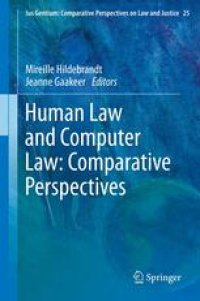
Ebook: Human Law and Computer Law: Comparative Perspectives
- Tags: Theories of Law Philosophy of Law Legal History, Philosophy of Law, Legal Aspects of Computing, Interdisciplinary Studies
- Series: Ius Gentium: Comparative Perspectives on Law and Justice 25
- Year: 2013
- Publisher: Springer Netherlands
- Edition: 1
- Language: English
- pdf
The focus of this book is on the epistemological and hermeneutic implications of data science and artificial intelligence for democracy and the Rule of Law. How do the normative effects of automated decision systems or the interventions of robotic fellow ‘beings’ compare to the legal effect of written and unwritten law? To investigate these questions the book brings together two disciplinary perspectives rarely combined within the framework of one volume. One starts from the perspective of ‘code and law’ and the other develops from the domain of ‘law and literature’. Integrating original analyses of relevant novels or films, the authors discuss how computational technologies challenge traditional forms of legal thought and affect the regulation of human behavior. Thus, pertinent questions are raised about the theoretical assumptions underlying both scientific and legal practice.
The focus of this book is on the epistemological and hermeneutic implications of data science and artificial intelligence for democracy and the Rule of Law. How do the normative effects of automated decision systems or the interventions of robotic fellow ‘beings’ compare to the legal effect of written and unwritten law? To investigate these questions the book brings together two disciplinary perspectives rarely combined within the framework of one volume. One starts from the perspective of ‘code and law’ and the other develops from the domain of ‘law and literature’. Integrating original analyses of relevant novels or films, the authors discuss how computational technologies challenge traditional forms of legal thought and affect the regulation of human behavior. Thus, pertinent questions are raised about the theoretical assumptions underlying both scientific and legal practice.
The focus of this book is on the epistemological and hermeneutic implications of data science and artificial intelligence for democracy and the Rule of Law. How do the normative effects of automated decision systems or the interventions of robotic fellow ‘beings’ compare to the legal effect of written and unwritten law? To investigate these questions the book brings together two disciplinary perspectives rarely combined within the framework of one volume. One starts from the perspective of ‘code and law’ and the other develops from the domain of ‘law and literature’. Integrating original analyses of relevant novels or films, the authors discuss how computational technologies challenge traditional forms of legal thought and affect the regulation of human behavior. Thus, pertinent questions are raised about the theoretical assumptions underlying both scientific and legal practice.
Content:
Front Matter....Pages i-viii
Front Matter....Pages 11-11
Prefatory Remarks on Part I: Law and Code....Pages 13-22
From Galatea 2.2 to Watson – And Back?....Pages 23-45
What Robots Want: Autonomous Machines, Codes and New Frontiers of Legal Responsibility....Pages 47-65
Abort, Retry, Fail: Scoping Techno-Regulation and Other Techno-Effects....Pages 67-87
A Bump in the Road. Ruling Out Law from Technology....Pages 89-121
Front Matter....Pages 123-123
Prefatory Remarks on Part II: Law and Literature....Pages 125-133
Control, Alt, and/or Delete? Some Observations on New Technologies and the Human....Pages 135-157
Law, Normativity, and the Writing. Oracle Night and Human Indeterminacy....Pages 159-179
When a Robot Can Love – Blade Runner as a Cautionary Tale on Law and Technology....Pages 181-194
Prefatory Remarks on Human Law and Computer Law ....Pages 1-9
Back Matter....Pages 195-202
The focus of this book is on the epistemological and hermeneutic implications of data science and artificial intelligence for democracy and the Rule of Law. How do the normative effects of automated decision systems or the interventions of robotic fellow ‘beings’ compare to the legal effect of written and unwritten law? To investigate these questions the book brings together two disciplinary perspectives rarely combined within the framework of one volume. One starts from the perspective of ‘code and law’ and the other develops from the domain of ‘law and literature’. Integrating original analyses of relevant novels or films, the authors discuss how computational technologies challenge traditional forms of legal thought and affect the regulation of human behavior. Thus, pertinent questions are raised about the theoretical assumptions underlying both scientific and legal practice.
Content:
Front Matter....Pages i-viii
Front Matter....Pages 11-11
Prefatory Remarks on Part I: Law and Code....Pages 13-22
From Galatea 2.2 to Watson – And Back?....Pages 23-45
What Robots Want: Autonomous Machines, Codes and New Frontiers of Legal Responsibility....Pages 47-65
Abort, Retry, Fail: Scoping Techno-Regulation and Other Techno-Effects....Pages 67-87
A Bump in the Road. Ruling Out Law from Technology....Pages 89-121
Front Matter....Pages 123-123
Prefatory Remarks on Part II: Law and Literature....Pages 125-133
Control, Alt, and/or Delete? Some Observations on New Technologies and the Human....Pages 135-157
Law, Normativity, and the Writing. Oracle Night and Human Indeterminacy....Pages 159-179
When a Robot Can Love – Blade Runner as a Cautionary Tale on Law and Technology....Pages 181-194
Prefatory Remarks on Human Law and Computer Law ....Pages 1-9
Back Matter....Pages 195-202
....